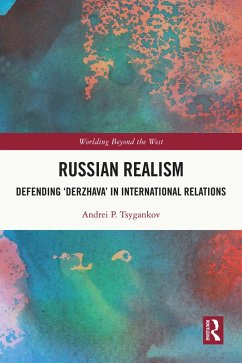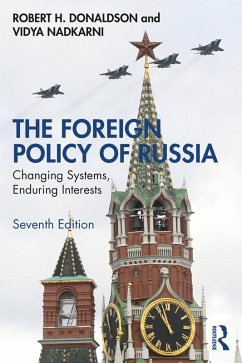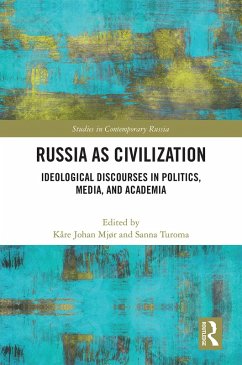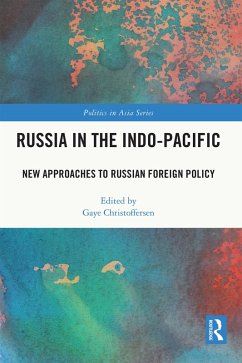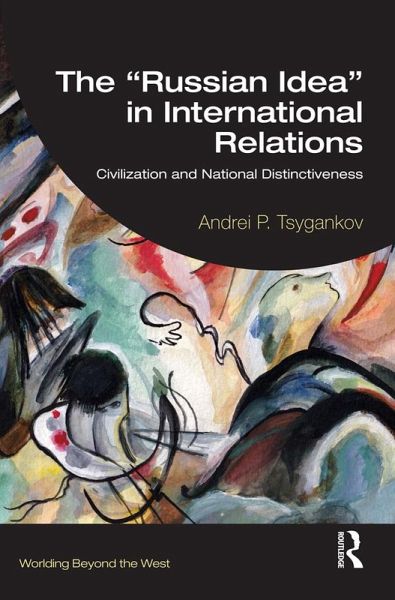
The "Russian Idea" in International Relations (eBook, ePUB)
Civilization and National Distinctiveness
Versandkostenfrei!
Sofort per Download lieferbar
38,95 €
inkl. MwSt.
Weitere Ausgaben:

PAYBACK Punkte
19 °P sammeln!
The "Russian Idea" in International Relations identifies different approaches within Russian Civilizational tradition - Russia's nationally distinctive way of thinking - by situating them within IR literature and connecting them to practices of the country's international relations.Civilizational ideas in IR theory express states' cultural identification and stress religious traditions, social customs, and economic and political values. This book defines Russian civilizational ideas by two criteria: the values they stress and their global ambitions. The author identifies leading voices among t...
The "Russian Idea" in International Relations identifies different approaches within Russian Civilizational tradition - Russia's nationally distinctive way of thinking - by situating them within IR literature and connecting them to practices of the country's international relations.
Civilizational ideas in IR theory express states' cultural identification and stress religious traditions, social customs, and economic and political values. This book defines Russian civilizational ideas by two criteria: the values they stress and their global ambitions. The author identifies leading voices among those positioning Russia as an exceptional and globally significant system of values and traces their arguments across several centuries of the country's development. In addition, the author explains how and why Russian civilizational ideas rise, fall, and are replaced by alternative ideas. The book identifies three schools of Russian civilizational thinking about international relations - Slavophiles, Communists, and Eurasianists. Each school focuses on Russia's distinctive spiritual, social, and geographic roots, respectively. Each one is internally divided between those claiming Russia's exceptionalism, potentially resulting in regional autarchy or imperial expansion, and those advocating the Russian Idea as global in its appeal. Those favoring the latter perspective have stressed Russia's unique capacity for understanding different cultures and guarding the world against extremes of nationalism and hegemony in international relations.
This book will be of interest to students and scholars of Russian foreign policy, Russia-Western relations, IR theory, diplomatic studies, political science, and European history, including the history of ideas.
Civilizational ideas in IR theory express states' cultural identification and stress religious traditions, social customs, and economic and political values. This book defines Russian civilizational ideas by two criteria: the values they stress and their global ambitions. The author identifies leading voices among those positioning Russia as an exceptional and globally significant system of values and traces their arguments across several centuries of the country's development. In addition, the author explains how and why Russian civilizational ideas rise, fall, and are replaced by alternative ideas. The book identifies three schools of Russian civilizational thinking about international relations - Slavophiles, Communists, and Eurasianists. Each school focuses on Russia's distinctive spiritual, social, and geographic roots, respectively. Each one is internally divided between those claiming Russia's exceptionalism, potentially resulting in regional autarchy or imperial expansion, and those advocating the Russian Idea as global in its appeal. Those favoring the latter perspective have stressed Russia's unique capacity for understanding different cultures and guarding the world against extremes of nationalism and hegemony in international relations.
This book will be of interest to students and scholars of Russian foreign policy, Russia-Western relations, IR theory, diplomatic studies, political science, and European history, including the history of ideas.
Dieser Download kann aus rechtlichen Gründen nur mit Rechnungsadresse in A, B, BG, CY, CZ, D, DK, EW, E, FIN, F, GR, HR, H, IRL, I, LT, L, LR, M, NL, PL, P, R, S, SLO, SK ausgeliefert werden.





